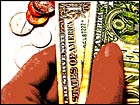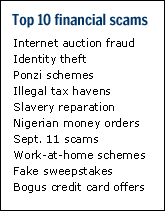
NEW YORK (CNN/Money) -
There's a sucker born every minute -- or so the saying goes. And con artists are counting on it.
Indeed, history is littered with the empty bank accounts of those who've been had by crafty grifters. But the advent of new technology it seems has worsened the blow: modern-day hucksters are armed with state-of-the-art tools.
"There are traditional scams that require consumers to participate in things like pyramid schemes or get-rich products," said Betsy Broder, assistant director for planning and information at the Federal Trade Commission, which handled more than 204,00 fraud complaints last year. "Then there are scams that take advantage of technology and deceive consumers without their participation."
Sept. 11 frauds

It's sickening to believe that anyone would capitalize on the tragedies of Sept. 11, but the National Fraud Information Center reports that con artists were quick to use 9/11 for personal gain. Most involve getting well-meaning individuals to donate money to fraudulent rescue charities.
Some unscrupulous telemarketers have promised consumers that if they buy magazine subscriptions, proceeds from their sale will be donated to recovery and rescue efforts. Others have called or e-mailed donation requests for fake charities.
If you want to give, use reputable charities that you've heard of. The Better Business Bureau Wise Giving Alliance lists information about charities. For more tips on giving safely, see "Give, but beware of scams."
Internet auctions
Online scams abound, of course, but it's phony auctions that make up a whopping 64 percent of all Internet con jobs, according to the Internet Fraud Complaint Center.
In such cases, those who bid on items never receive the merchandise they pay for, or they get something less than they expected. eBay, the most popular online auction site, states explicitly in its user agreement that it takes no responsibility for the transactions conducted on its site. But it will halt bids if criminal activity is suspected.
The best protection when bidding for goods online is to pay by credit card so you can get your money back if you're ripped off. Eighty percent of individuals who are conned in online auctions lost money because they paid by check or money orders.
Identity theft
As word spreads about the dangers of identity theft, many consumers take care not to dispense sensitive personal information over the Internet. But it turns out that only 2 percent of I.D. theft cases are traced to the Net. More often, con artists count on consumers to give up information doing everyday activities.
Writing a driver's license number on a check, for example, or signing receipts that are stamped with full credit card account numbers make it a snap for crooks to obtain sensitive information and steal identities.
Be careful about the kind of information you make public. For example, don't toss out bank statements without shredding them and check your receipts before signing your name. Stores that print your full account number generally don't have a problem if you scratch out some of the numbers. But if the clerk won't allow it, take your business elsewhere.
If you believe you've been the victim of ID theft, contact credit bureaus like Equifax, Experian and Trans Union and ask that a fraud alert be placed on your account.
You also should report fraud to credit card companies, stores and agencies like your state motor vehicle department and the Social Security Administration.
Charles Ponzi and the postage scandal
| 
| |
| | |
|
Some 500,000 individuals were the victims of identity theft last year.
| |
| | |
| 
| |
| | |
|
National Fraud Information Center
| |
|
Ponzi schemes, also known as pyramid schemes, hold a special place in the annals of financial scams. They work by luring individuals into bogus deals (including investment schemes) that promise fat returns. Early investors are paid off with money from new recruits, but as the scheme grows larger it eventually collapses under its own weight since there's less coming in than there is going out.
The man who developed this scheme was Charles Ponzi, who in the 1920's lured thousands of individuals to buy foreign mail coupons by promising hefty 40-percent returns on their investments. The scam lasted about eight months, but Ponzi's crooked legacy lives today as new hucksters develop their own spinoffs.
More recently, a private company called Bennett Funding Group bilked 12,000 investors and more than 200 banks of $700 million in 1997 when it sold sham office equipment leases. Many of the leases were pledged to more than one investor. After the company was exposed, the Securities and Exchange Commission labeled it one of America's biggest Ponzi schemes.
Offshore tax havens
The come on: Keep your cash in a Caribbean bank and out of the hands of the IRS.
Word to the wise: Don't believe the hype.
Illegal tax havens are among the most common financial scams. They are run by operators who get individuals to pay up to $40,000 for so-called offshore tax trusts meant to escape notice of the good folks at the Treasury Department, said Gerald Kelley, an attorney with Frank & Assoc. in Bethesda, MD.
Trouble is, there's no such thing. "I've got one client right now and he kept filing offshore trust returns for years. But the IRS caught up with him and he's being audited for 1996, 1997 and 1998," Kelly said.
Slavery reparation rip-offs
In the past year, thousands of African Americans have been suckered by unscrupulous advisers who promise to obtain tax refunds for slavery reparations -- for a small fee. There's one catch. There is no provision to pay reparations under the tax law, and reparation claims will be denied.
Still, last year the IRS processed nearly 80,000 tax returns claiming a total of $2.7 billion in reparations. The agency has warned African Americans about the fraud, but hucksters already have moved on to different groups, including Native Americans.
Nigerian money offers
This scam has been around for decades, yet it continues to grow because con artists now let the Internet do their dirty work. In fact, last year Nigerian money offers ranked among the top three Internet crimes, and victims' average losses ran $5,957, according to the National Consumers League, which runs the National Fraud Information Center.
Posing as government officials, con artists contact victims by mail or e-mail and claim to have millions of dollars in government money. They say they need a foreign account to launder the cash and will share it with anyone who sends them a substantial "transfer fee" or who provides a bank number to transfer the cash out of the country. Suckers who fall for this soon find their own bank accounts cleared out.
"They're hitting millions of people," said Holly Anderson, spokeswoman for National Consumers League. "These con artists know how to manipulate. They'll go for months, e-mailing the victims to get their trust. It's really frightening."
Work-at-home scams
Who hasn't dreamed of earning a good living without the hassle of a morning commute? Be careful what you wish for. One of the top scams today involves hucksters telling individuals they can earn big bucks from home once they buy certain training manuals, software or other materials. On average, consumers have dropped $121.
Victims usually are stay-at-home moms, disabled individuals or younger people. They end up paying money -- or even giving out their bank debit card number -- to start a business like medical billing or envelope stuffing.
Consumers considering telemarketing or Internet offers also can call the National Fraud Information Center hotline for advice at (800) 876-7060, which is open weekdays from 9 a.m. to 5 p.m. EST.
Phony prizes
Prize and sweepstake scams continue to attract victims, particularly the elderly, who agree to pay money to obtain prizes. Some individuals even reveal credit card numbers to collect. Others are told they have to pay taxes on the prize before they can get it.
That said, never pay for a prize. If you win something, legitimate sweepstakes will provide you with Form 1099, which states the prize value. It must be reported on your taxes. But you receive the tax form after you receive a prize, not before. For more help see the IRS Web site.
Credit card offers
It's awful to be kicked when you're down, but that's exactly what's happening. Con artists are promising to help people with bad credit obtain a credit card and to rebuild their credit in exchange for an application fee. In some cases, the sham operation promises contact multiple issuers until they obtain at least one card for the client. Individuals usually lose $198 for cards that never materialize.
The best way to get a card? Rebuild your credit. Groups likeMyvesta have debt counselors and online information to help you get financially strong. "The ideal budget" can help you help map out a solid plan. Finally, read Money 101 lesson on controlling debt.

|

